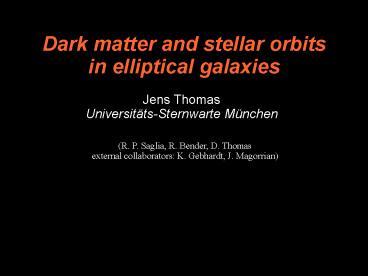PowerPointPrsentation - PowerPoint PPT Presentation
1 / 31
Title:
PowerPointPrsentation
Description:
radial anisotropy. 9 flattened ellipticals (in Coma): axisymmetric models ... Medium bright Coma ellipticals are mostly flattened by anisotropy! ... – PowerPoint PPT presentation
Number of Views:44
Avg rating:3.0/5.0
Title: PowerPointPrsentation
1
Dark matter and stellar orbits in elliptical
galaxies
Jens ThomasUniversitäts-Sternwarte München
(R. P. Saglia, R. Bender, D. Thomas external
collaborators K. Gebhardt, J. Magorrian)
2
brief motivation
dark matter in ellipticals predicted by galaxy
formation models not known very well possible
indicator of assembly time earlier assembly ?
denser halo orbital structure of
ellipticals indicator of formation
mechanism collapse of gas cloud? radial
velocities dominate merger of spirals ?
diversity of dynamical structure
3
dark matter spiral galaxies
(van Albada 1985)
2-dimensional, rotating exponentially declining
light-profiles vrot const implies ? ? r-2
4
the case of elliptical galaxies
Line-of-sight velocity distribution (LOSVD)
3-dimensional ? projection effects ? LOSVDs orbit
distribution not known mass and orbital structure
to be determined
5
observables of orbital structure
orbital structure and potential can be derived
from shapes of LOSVDs
for the present project (v,s,h3,h4) out to 3 Reff
6
dynamics of ellipticals
most general description phase-space
distribution function f f d3r d3v ... number of
stars in phase-cell observables light-profile
? f d3v dz LOSVD ? f d2v? dz Jeans
theorem f f(I1,I2,...) I1,I2 ... Integrals
of motion ? orbits f const along orbits
galaxy superposition of orbits only total
light on orbits to be determined
7
studies so far and present project
25 round galaxies (Gerhard et al.
2001) assuming spherical symmetry ? integrals
known E,L2 ? analytical models clear DM
detections in 50 of galaxies uniform dynamical
structure radial anisotropy 9 flattened
ellipticals (in Coma) axisymmetric models BUT
integrals not all known explicitly E, Lz and
I3 ? orbit superposition method
8
orbit superposition method
- deprojection
9
orbit superposition method
- deprojection
- trial mass model
10
orbit superposition method
- deprojection
- trial mass model
- orbit library
11
orbit superposition method
- deprojection
- trial mass model
- orbit library
- orbit superposition
advanced version of the axisymmetric code
of Gebhardt, Richstone, Tremaine et al.
12
choice of orbits
axisymmetric potentials (E, Lz) ? (rmin, rmax) E
determines rmax Lz determines rmin v? Lz/R
13
choice of orbits
axisymmetric potentials (E, Lz) ? (rmin, rmax) E
determines rmax Lz determines rmin v?
Lz/R distinct orbits with same (E, Lz) ? third
integral
14
choice of orbits
axisymmetric potentials (E, Lz) ? (rmin, rmax) E
determines rmax Lz determines rmin v?
Lz/R distinct orbits with same (E, Lz) ? third
integral
15
choice of orbits
orbital shapes can be mapped onto (R,vR)
16
choice of orbits
orbital shapes can be mapped onto
(R,vR) representative orbit sampling from grid in
(R,vR)
17
combining the orbits
10000 orbits vs. 500 observational constraints ?
able to fit noise in data ? regularisation weight
of each orbit follows from S - ??2 ? max S ?
wi log(wi/Vi) entropy (smoothness) of orbit
model ?2 ? (LOSVDdata - LOSVDmodel)2 fit to
data ? ... regularisation parameter ? ? 0
maximum entropy ? ? ? best fit to data
18
axisymmetric test models
Regularisation Monte-Carlo simulations of test
objects with known intrinsic properties minimize
deviations ? between model and test object ? ? 15
per cent accuracywhen modeling pseudo-data with
realistic error-bars
19
a real galaxy NGC 4807
models without dark matter systematically fail
20
a real galaxy NGC 4807
dark matter is needed in the outer parts 3
parameters can be determined ?stars ? x
light-profile rC, vC (halo core radius and
normalization)
21
mass densities in ellipticals
central regions dominated by luminous mass
(independent of halo profile) dark matter becomes
imortant around 1-2 reff region with data ? ?
r-2 (like in spirals)
22
dark matter fractions in ellipticals
10 - 50 percent of mass inside reff is dark matter
23
halo scaling relations of ellipticals
ellipticals obey similar scaling laws as spirals
central dark matter densities slightly higher in
ellipticals than in spirals zform ? 2-3?
24
the flattening of ellipticals
stars in ellipticals are collisionless velocity
dispersions can be anisotropic ?r ? ?? ?
?? anisotropy ? formation process
25
the flattening of ellipticals
??
??
anisotropy ?? 1 - ??2/?r2 ?? 1 - ??2/?r2
26
the flattening of ellipticals
??
??
anisotropy ?? 1 - ??2/?r2 ?? 1 - ??2/?r2
27
the flattening of ellipticals
??
??
Medium bright Coma ellipticals are mostly
flattened by anisotropy!
28
comparison with merger simulations(in
collaboration with R. Jesseit, T. Naab, A.
Burkert from USM)
comparison of real galaxy models with ?100
collisionless N-body merger remnants of Naab
Burkert 2003 2 x (diskbulgehalo)
various initial orbits progenitor
mass-ratios 41 to 11 modeling N-body mergers
like real galaxies ellipticals are not
exactly axisymmetric N-body mergers allow
to test the code under realistic
conditions systematic errors lt 30 for
M(reff)
29
the flattening of ellipticals
??
??
Collisionless mergers are also flattened by
anisotropy!
30
fine-structure in ellipticals
the galaxy IC3947 has an embedded rotating disk
that is not directly seen on the HST image
31
Summary and outlook
extensively tested orbit modeling program dark
matter in elliptical galaxies 10-50 percent
inside reff slightly denser halos than in
spirals overall similar scaling laws as in
spirals studied ellipticals are flattened by
anisotropy like collisionless mergers high
degree of relaxation but ellipticals show a lot
of fine structure that cannot be explained by
purely collisionless processes in future more
galaxies (?30, better statistics)
more detailed comparison with galaxy formation
simulations































